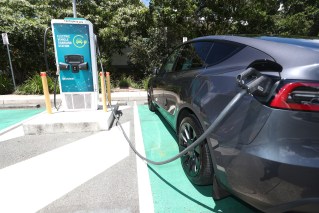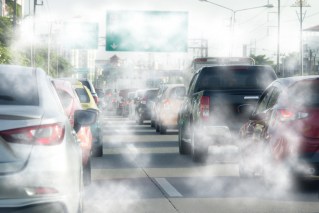Your diesel car may be more poisonous than first thought


Daimler's alleged sleight of hand centred on diesel engines. Photo: Getty
If you’re driving a diesel car your health may be in danger, say experts, following a new wave of protests calling for the toxic fuel to be banned from urban areas.
Campaign group Doctors Against Diesel held a protest in London last week calling on Mayor Sadiq Khan to ban all diesel cars from the UK capital.
The group, comprised of doctors, nurses and health professionals, claimed 9400 Londoners die prematurely each year as a result of breathing in toxic fumes.
“What we’re asking for is a phase out of diesel. Air pollution is a massive issue and is absolutely terrible from a health point of view – diesel is a huge part of that,” campaigner Hugh Grant-Peterkin told BBC.
And experts are repeating the call for a ban of diesel in Australia.
“It’s something we don’t need and is doing harm. The sooner we get it out of our urban areas the better,” Queensland University of Technology associate professor Adrian Barnett told The New Daily.
“It’s not only about reducing health effects. It’s about reducing exposure and a great way to do that is to stop it at the source.”
Airborne poison
Diesel exhaust fumes have been categorised as a group one carcinogen by the International Agency for Research of Cancer, meaning they can cause cancer in humans.
The list of health problems associated with diesel range from stroke, heart attack, respiratory disease, asthma, wheezing and even death.
According to University of Queensland public health senior lecturer Luke Knibbs, driving diesel vehicles not only puts you at risk, but everyone around you as well.
“The general population can be exposed to diesel in a variety of locations, we know from some of the studies we’ve done previously that the highest exposure to vehicle combustion occurs on and near roads,” Dr Knibbs told The New Daily.
“If you do have a diesel car that has a leaky exhaust, or are in a lot of stop-start traffic, then there’s the potential for the emissions in your car to get into the cabin, but generally speaking it’s the people around you who tend to bear the brunt of it.”
Why is diesel so dangerous?

Diesel fumes have been linked to stroke, heart attack, respiratory disease and death. Photo: Getty
According to the World Health Organisation, air pollution is the major environmental risk to health, and exposure to particles from diesel exhaust is a significant danger to humans.
“There is a close, quantitative relationship between exposure to high concentrations of small particulates and increased mortality or morbidity,” it stated.
Those gases are “the main pollutant that causes a lot of respiratory and other physiological effects”, Curtin University occupation and environment associate professor Ben Mullins said.
“Globally, cardio-respiratory illnesses are the second-biggest killer worldwide and a lot of those are related to air pollution, including diesel exhaust.”
In 2015, the US Environmental Protection Agency determined diesel fumes from such vehicles emitted up to 40 times more nitrogen oxide than current emission standards allow.
It found there were a total of 11 million vehicles like this worldwide, noting Volkswagen and Audi four-cylinder diesel cars as the main culprits.
Volkswagen has since stopped producing diesel vehicles in the United States.
What is being done?
Paris, Madrid, Mexico City and Athens have all committed to banning diesel vehicles by 2025, but in Australia little has changed.
According to Assoc Prof Mullins, Australia is lagging behind in its categorisation of diesel fumes.

Air pollution is a major contributor to global cardio-respiratory illnesses. Photo: Getty
“Australia has been slow to adopt the most advanced European emission standards. We are a few years behind Europe in terms of emission standards,” he said.
Australia operates under the European emission standards for measuring passenger car emissions.
It determines the level of emissions and the standards the vehicle must meet on a scale from one to six – six being the most polluting.
Diesel passenger vehicles in Australia are currently categorised at ‘Euro 5’, but experts believe a tightening of limits on particulate emissions is required further.
‘Euro 6’ is set to be phased in in Australia in 2018.








